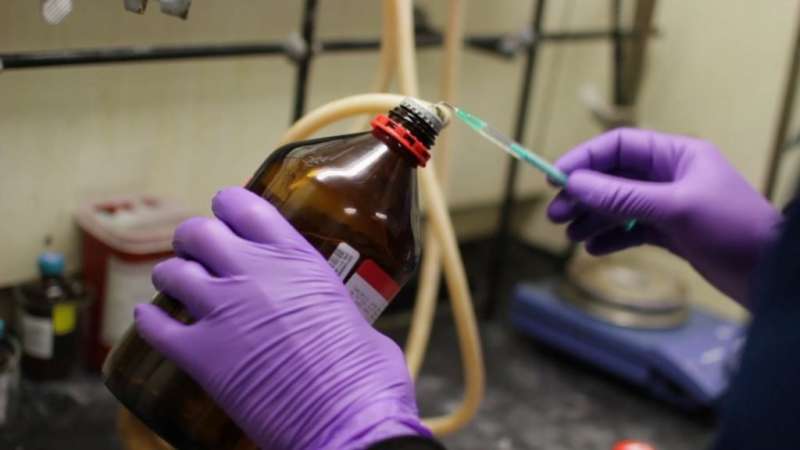Synthetic macromolecules kill multidrug-resistant cancer cells

Cancer continues to be a deadly threat to more than 14 million people who are diagnosed each year around the world. At the same time, five-year survival rates have been steadily improving over the last three decades to nearly 70 percent, according to the American Cancer Society. However, current cancer treatment regimens, such as traditional radiation therapies, often kill healthy cells along with diseased ones. Chemotherapy, or the use of anti-cancer drugs, can fail as drug resistance in the treatment of cancer has become commonplace, both with existing drug-resistant cancer cells as well as induced resistance. So devastating is the issue of drug resistance, that it is a critical aim of the Cancer Moonshot, a program established by the U.S. government, to vastly accelerate cancer research.
To address these critical issues our team of scientists at IBM Research – Almaden in San Jose, Calif. together with Singapore's Institute of Bioengineering and Nanotechnology (IBN), Institute of Molecular and Cell Biology (IMCB) and Genome Institute of Singapore (GIS) developed a new class of synthetic polymer designed to selectively kill cancer cells, while ignoring healthy cells. In testing, cancer cells were unable to develop resistance to this new class of macromolecules, which could also be effective against cancer cells that are resistant to other drugs.
Our studies focused heavily on the potential for macromolecules, a large molecule or polymeric assembly, which exhibit unique properties to attack diseases by different mechanisms. The emerging discipline of study, pioneered by Dr. James Hedrick of IBM Research-Almaden, is known as Macromolecular Therapeutics, and its use in destroying cancer cells was published today in the peer-reviewed Journal of the American Chemical Society.
In this study, researchers demonstrated that a macromolecule containing positively charged components was able to bind to the negatively charged surfaces of the cancer cells. Another portion of the macromolecule assimilated into the cell membrane, poking holes in the cancer cell and destroying it from within. In early tests, the macromolecule proved successful in 1) combating drug-resistant cancer cells and cancer stem cells 2) preventing cancer cell migration (metastasis) and 3) defying drug resistance after multiple treatment applications.
Our research team pushed to address issues that frequently plague cancer treatment including drug resistance, insufficient drug accumulation in tumor tissue, low solubility of chemotherapeutics, rapid clearance from the body and off-target toxicity. The study utilized laboratory models to demonstrate early efficacy of the molecules, should they be used in the future as a potential treatment. The macromolecules were designed to self-assemble into core-shell structured nanoparticles, which typically accumulate in tumor tissues by passing through leaky blood vessels in the tumor microenvironment.
In the study, the shell prevented the anticancer core from interacting with healthy cells before reaching the tumor where it interacted with negative charges on cancer cell membranes, causing membrane disruption and killing the cancer cells. We also evaluated whether or not multiple treatments with the polymer could contribute to resistance development in cancer cells. After multiple rounds of treatment in the study, the macromolecule retained its potency and no onset of resistance was observed. Overall, the macromolecules were shown to be effective in overcoming some of the common issues that patients may face with traditional cancer treatments.
The new study builds on a May 2016 study announcing the discovery of a macromolecule that holds potential to fight viruses and a study released earlier this month showing that macromolecules may help fight superbugs such as MRSA in the future. The study of Macromolecular Therapeutics spans several years and multiple diseases, and there are numerous potential applications for these innovations, including: consumer product additives, fighting systemic viral and bacterial infections, addressing agricultural disease, and supporting cancer treatment. Fundamental advancements in synthetic polymer chemistry form the foundation for these therapeutic platforms, enabling the preparation of biocompatible and degradable macromolecules with precisely defined properties.
While we are excited about the promise of this study, we note that we are still is in the early stages of research. We are seeking pharmaceutical industry partners to help us accelerate the further development of these polymers, in hopes of someday making this available as a new treatment to cancer patients. In addition, stay tuned for upcoming research news as we expand the scope of macromolecular therapeutics to other areas of application.
More information: Nathaniel H. Park et al. Addressing Drug Resistance in Cancer with Macromolecular Chemotherapeutic Agents, Journal of the American Chemical Society (2018). DOI: 10.1021/jacs.7b11468



















